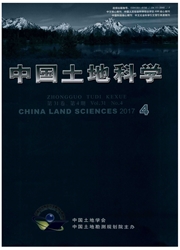

 中文摘要:
中文摘要:
研究目的:评价北京市顺义区制造业用地集约度,分析影响制造业集约用地的因素及影响方式。研究方法:基于对顺义区制造业企业用地及主要经济指标的调查资料,结合厂商行为理论,借助因子分析法及Logistic逐步回归模型进行分析。研究结果:制造业企业的集约用地行为表现为单位面积上产值收益的增加、劳动力投入的增加或者资金投入的增加;产业结构、人口和劳动力、交通运输、聚集效应等影响因素对各个行业集约用地水平的作用方式及影响程度是不同的。研究结论:土地的集约利用程度与区位因素紧密相关,制造业的空间布局优化是促进土地集约利用的重要措施之一。
 英文摘要:
英文摘要:
The purpose of this paper is to assess the intensive degree of industrial land use in Shunyi District of Beijing City, and analyze its influencing factors. Based on the survey data of industrial enterprise land and main economic indices of Shnnyi District, as well as the firm behavior theories, the paper conducted an empirical study by using the factor analysis and Logistic stepwise regression model. The results indicate: (1)the intensive land use behaviors of manufacturing enterprises can be reflected by the increase of output per unit area, the increase of labor input and capital input; (2)the mechanism and the degree of the impacting factors are different regarding the industrial structure, population and labor force, transportation condition, and agglomeration effect. It is concluded that the intensive land use degree is closely related to location factors, and the optimization of spatial distribution for manufacturing industries is one of the important measures to promote the intensive land use.
 同期刊论文项目
同期刊论文项目
 同项目期刊论文
同项目期刊论文
 期刊信息
期刊信息
